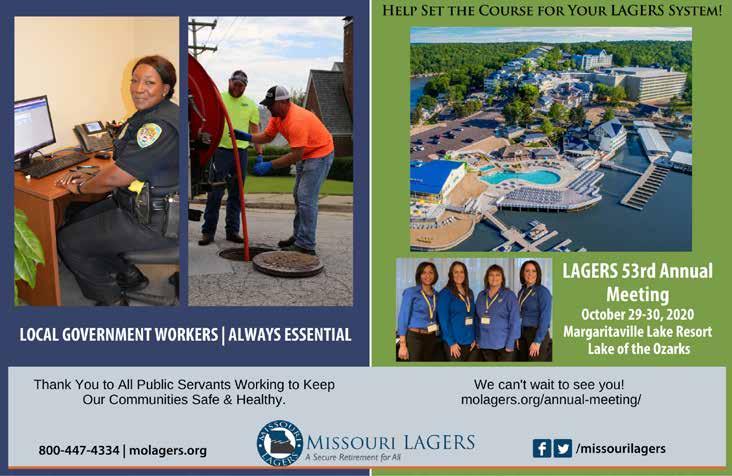
6 minute read
Supreme Court Preview For Local
FEATURE Review by Lisa Soronen, State and Local Legal Center, Washington, D.C.
Advertisement
The State and Local Legal Center (SLLC) files Supreme Court amicus curiae briefs on behalf of the Big Seven national organizations representing state and local governments. *Indicates a case where the SLLC has filed or will file an amicus brief.
As of mid-July, the Supreme Court’s 2020-2021 docket looks a little different than usual. It includes 10 cases the Court was supposed to decide in the 2019-2020 term but did not due to COVID-19. This article discusses two of those cases, that were previously discussed in the SLLC’s Supreme Court Midterm article for local governments. Since that article was published, the Court has accepted two more cases of interest to local governments, also discussed in this article.
New Cases
In Fulton v. City of Philadelphia* the Supreme Court will decide whether local governments may refuse to contract with foster care agencies who will not work with gay couples.
The city of Philadelphia long contracted with Catholic Social Services (CSS) to place foster care children. The City stopped doing so when it discovered CSS would not work with same-sex couples. Philadelphia requires all foster care agencies to follow its “fair practices” ordinance, that prohibits sexual orientation discrimination in public accommodations.
CSS claims the City violated the First Amendment by refusing to continue contracting with it because of its religious beliefs. The Third Circuit ruled in favor of the City.
The Supreme Court has interpreted the First Amendment’s Free Exercise Clause to forbid “government acts specifically designed to suppress religiously motivated practices or conduct.” But, per the Court in Employment Division v. Smith (1990), individuals must comply with “valid and neutral law[s] of general applicability” regardless of their religious beliefs.
CSS first argues that Philadelphia’s “fair practices” ordinance is not applied to it neutrally. According to the Third Circuit, the test for neutrality is whether the City treated CSS “worse than it would have treated another organization that did not work with same-sex couples as foster parents but had different religious beliefs,” which the City did not do.
CSS has asked, and the Supreme Court has agreed, to reconsider the Court’s holding in Employment Division v. Smith.
CSS also claims Philadelphia is requiring it to “adopt the City’s views about same-sex marriage and to affirm these views in its evaluations of prospective foster parents,” in violation of the First Amendment’s Free Speech Clause. The Third Circuit agreed that the City couldn’t condition contracting with CSS on it officially proclaiming support for same-sex marriage but it could condition contracting with CSS on refusing to work with same-sex couples.
The question the Supreme Court will decide in Uzuegbunam v. Preczewski* is whether the government changing a policy after a lawsuit has been filed renders the case moot if the plaintiff has only asked for nominal damages.
Georgia Gwinnett College students Chike Uzuegbunam and Joseph Bradford sued the college over its Freedom of Expression policy, that only allowed students to engage in expressive activities in two designated areas after getting a permit. They sought an injunction preventing the college from enforcing its policy and nominal damages. The college then changed the policy.

The district court concluded the students’ claims for injunctive relief were moot — Uzuegbunam’s because he graduated, and Bradford’s because the college changed its policy. Uzuegbunam and Bradford do not challenge these conclusions.
The Eleventh Circuit also agreed with the district court that the students’ claims for nominal damages do not keep this case alive because nominal damages would not “have a practical effect on the parties’ rights or obligations.” According to the Eleventh Circuit, circuit precedent held that nominal damages have no practical effect absent “a well-pled request for compensatory damages.” Uzuegbunam and Bradford did not ask for compensatory damages.
Moved Cases
In City of Chicago, Illinois v. Fulton* the Supreme Court will decide whether a local government must return a vehicle impounded because of code violations immediately upon a debtor filing for bankruptcy.
The city of Chicago impounds vehicles where debtors have three or more unpaid fines. Robbin Fulton’s vehicle was impounded for this reason. She filed for bankruptcy and asked the City to turn over her vehicle; it refused.
Fulton claims the Bankruptcy Code’s “automatic stay” provision requires
WE KEEP ECONOMIES FLOWING

Our affordable, high-quality water and wastewater services have helped Missouri communities grow since 1879.
WE KEEP LIFE FLOWING™
missouriamwater.com
the City to immediately return her vehicles even though she did not pay her outstanding tickets. The Seventh Circuit agreed.
The “automatic stay” provision provides that a bankruptcy petition “operates as a stay, applicable to all entities, of … any act to obtain possession of property of the estate or of property from the estate or to exercise control over property of the estate.” In a previous case, the Seventh Circuit concluded that “exercise control” includes holding onto an asset and that “exercise control” is not limited to “selling or otherwise destroying the asset.” So, the lower court reasoned in this case, the city of Chicago “exercised control” over Fulton’s car in violation of the automatic stay by not returning it after she filed the bankruptcy petition.
The Supreme Court has held that excessive force violates the Fourth Amendment’s prohibition against “unreasonable searches and seizures.” The question in Torres v. Madrid* is whether police have “seized” someone they have used force against who has gotten away.
In this case, police officers approached Roxanne Torres thinking she may have been the person they intended to arrest. At the time Torres was “tripping” from using meth for several days. She got inside a car and started the engine. One of the officers repeatedly asked her to show her hands but could not see her clearly because the car had tinted windows. When Torres “heard the flicker of the car door” handle, she started to drive thinking she was being carjacked. Torres drove at one of the officers who fired at Torres through the windshield. The other officer shot at Torres as well to avoid being crushed between two cars, and to stop Torres from driving toward the other officer. Torres was shot twice.
After she hit another car, she got out of the car she was driving and laid on the ground attempting to “surrender” to the “carjackers.” She asked a bystander to call the police, but left the scene because she had an outstanding warrant. She then stole a different car, drove 75 miles, and checked into a hospital.
The Tenth Circuit found no excessive force in this case because Torres was not successfully “seized” under the Fourth Amendment. In a previous case the Tenth Circuit held that “a suspect’s continued flight after being shot by police negates a Fourth Amendment excessive-force claim.”

Conclusion
COVID-19 isn’t going to slow the Supreme Court down next term. It is likely that the Court will not hold in-person oral arguments when next term begins on October 5. Instead, the Court will likely continue holding oral arguments using live audio open to the public. This format was very popular when the Court used it to hear 10 cases last May. The big question for the Supreme Court and Americans is whether the Court will continue to offer live arguments available to the public when the pandemic is over.
Lisa Soronen is the executive director of the State and Local Legal Center (SLLC). Prior to joining the SLLC, Ms. Soronen worked for the National School Boards Association, the Wisconsin Association of School Boards, and clerked for the Wisconsin Court of Appeals.










